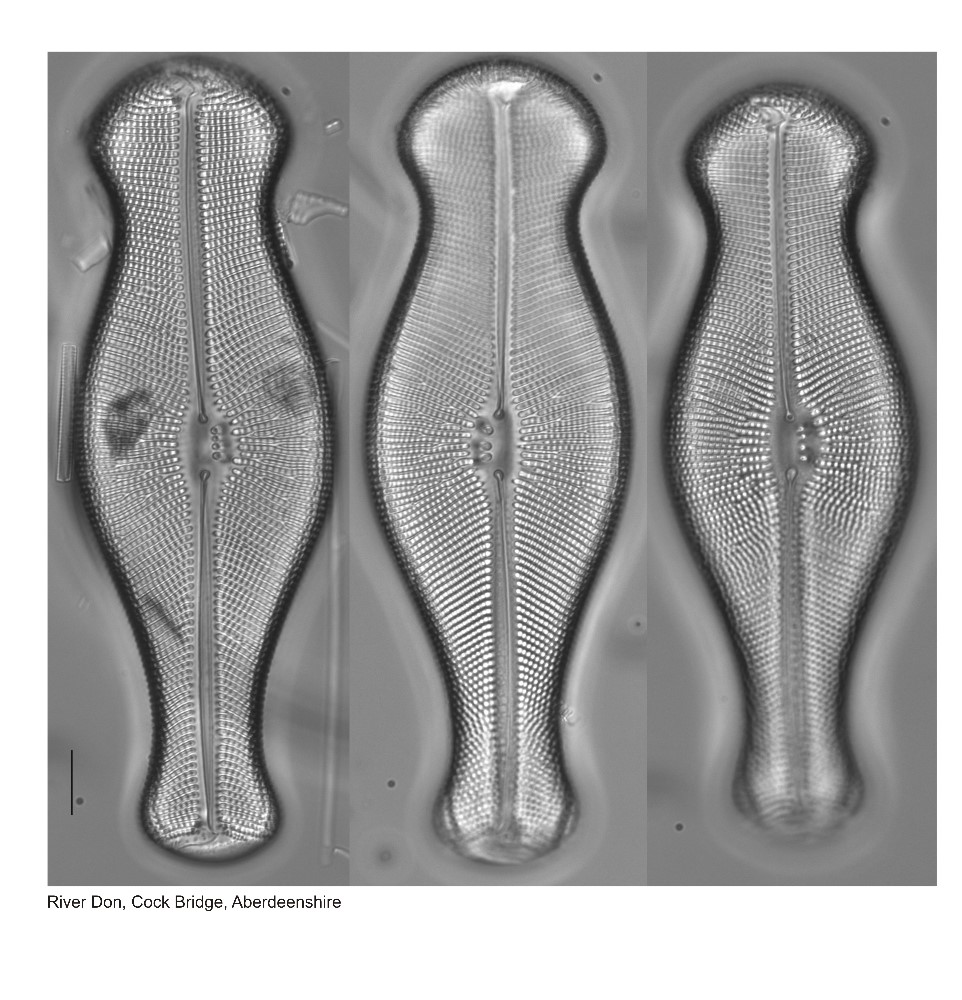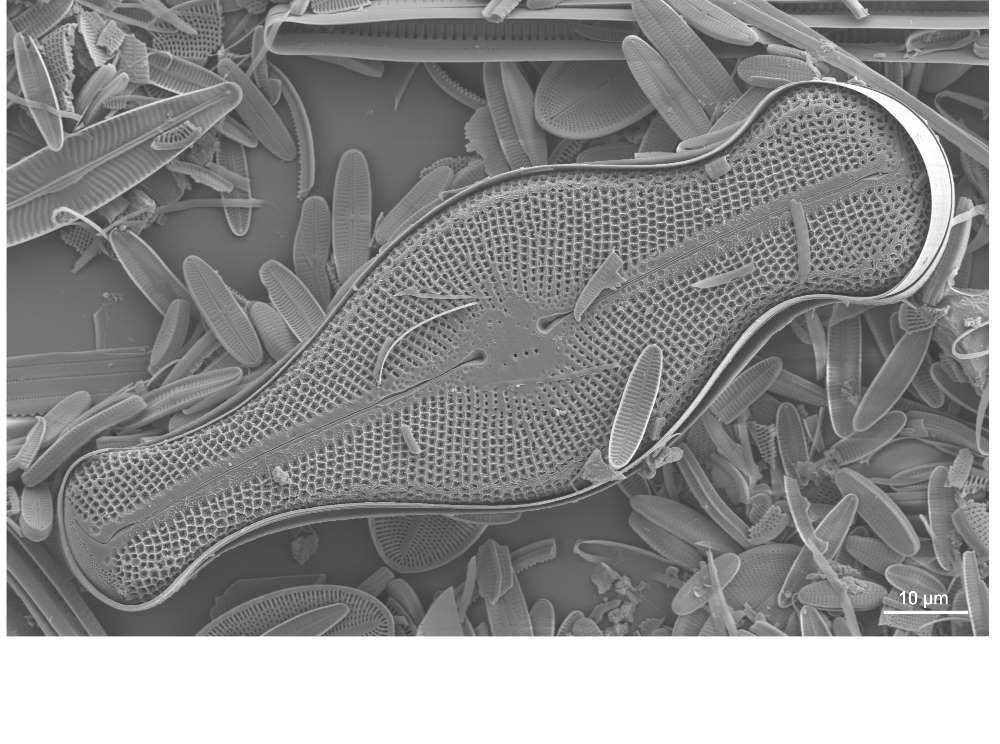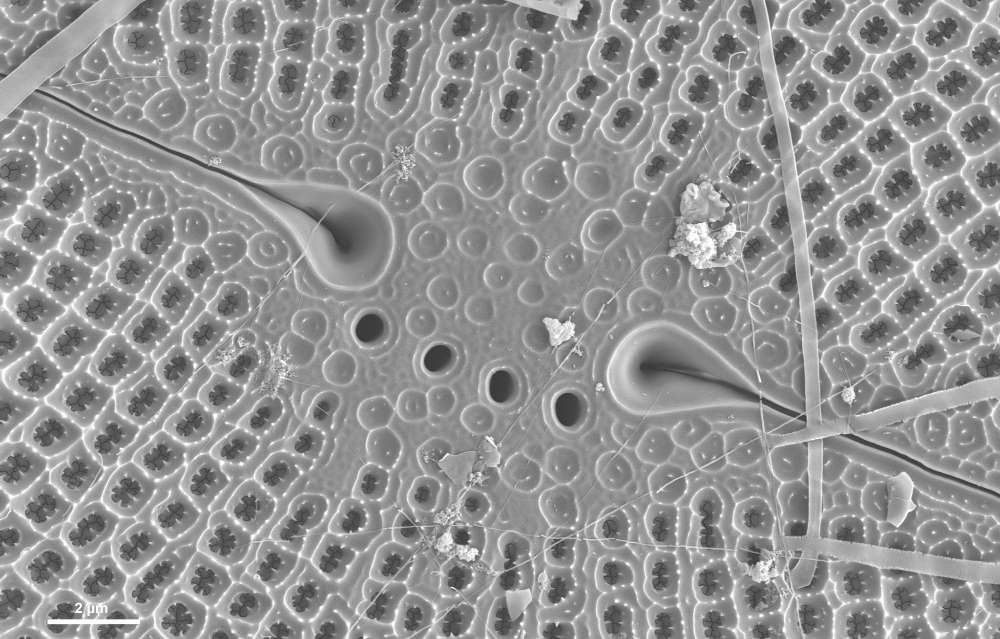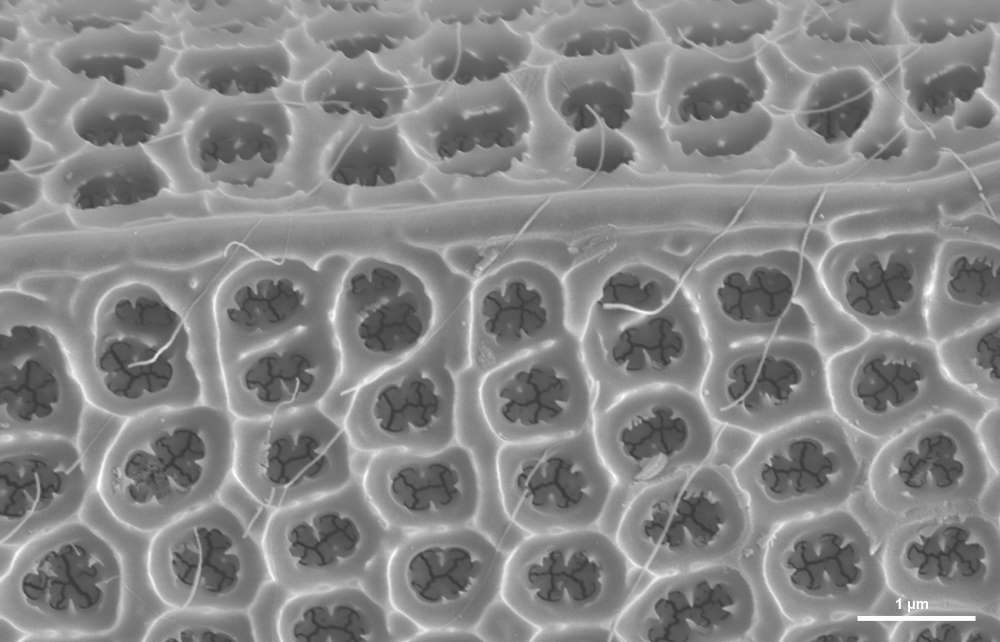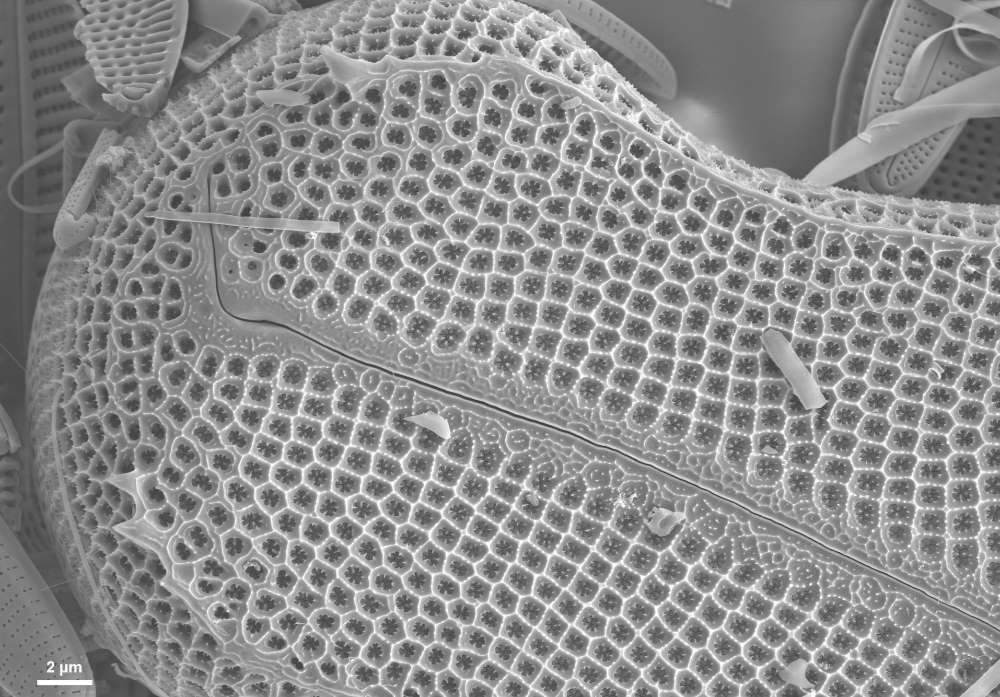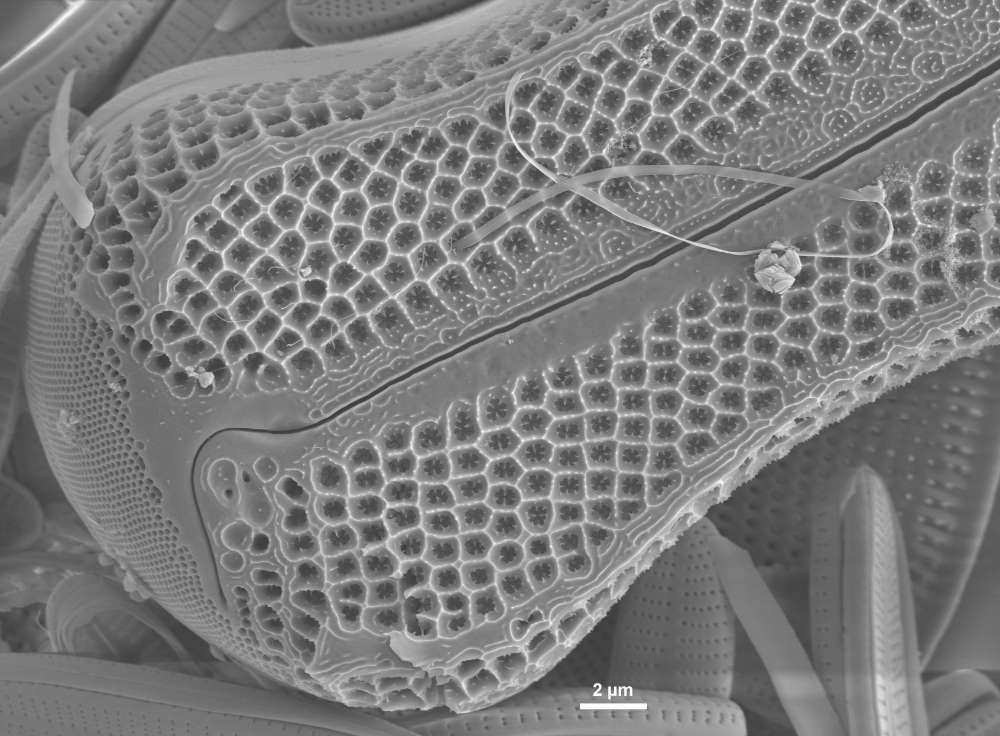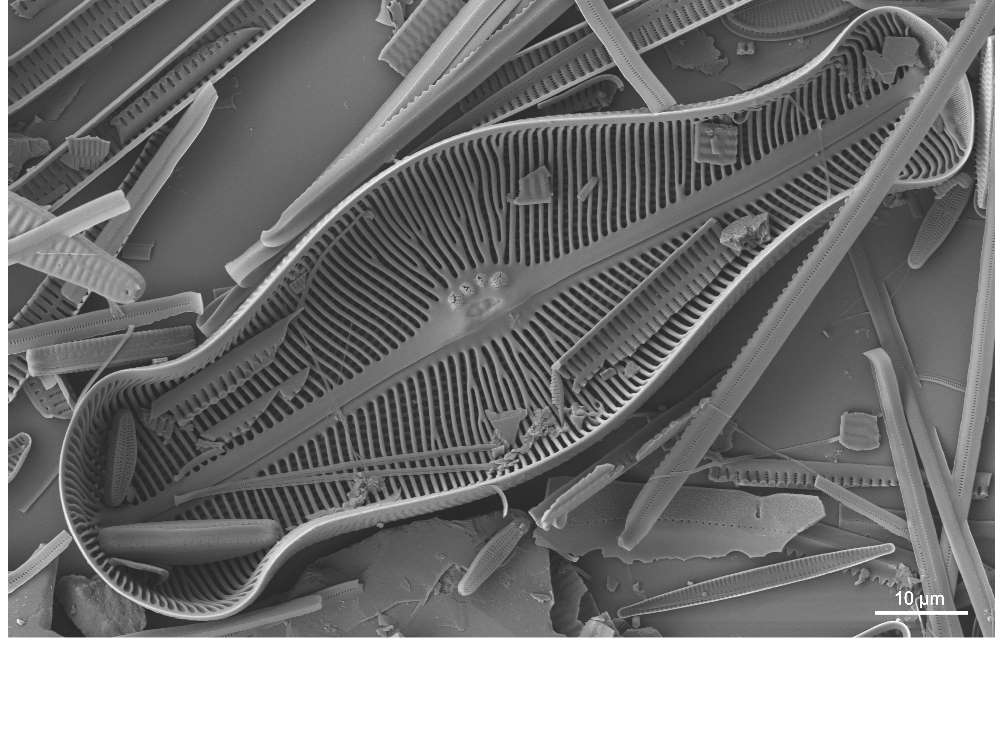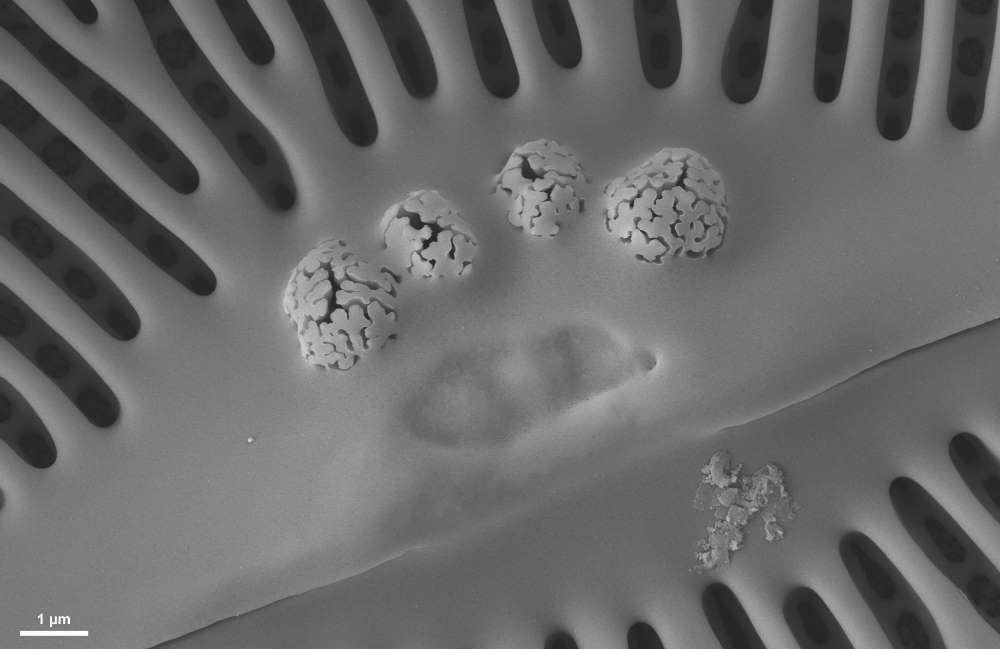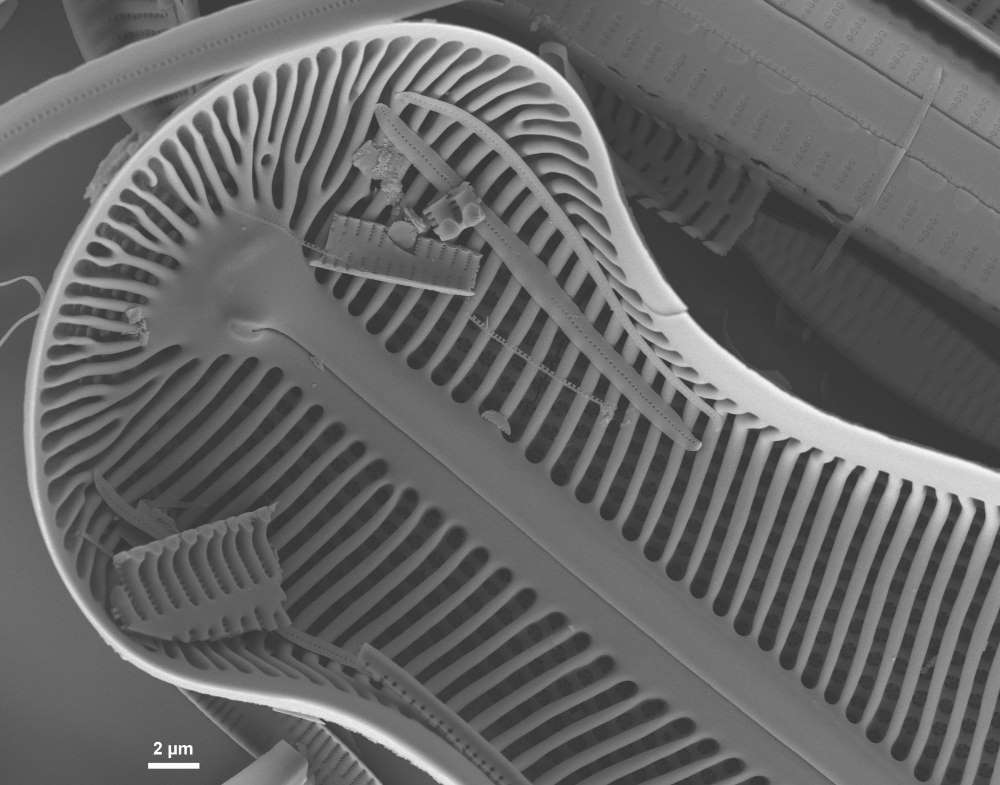Didymosphenia geminata (Lyngbye) M.Schmidt in Schmidt et al.; 1899; pl.214
Key references
Whitton B.A., Ellwood N.T.W., Kawecka B. 2009. Biology of the freshwater diatom Didymosphenia: a review. Hydrobiologia. 630: 1-37.
Metzeltin D., Lange-Bertalot H. 2014. The genus Didymosphenia M. Schmidt. A critical evaluation of established and description of 11 new taxa. Iconographia Diatomologica Vol. 25, Koeltz Scientific Books. 298 pp
Morphology
Size
Length 60-161 µm, width 25-43 µm (Krammer & Lange-Bertalot 1986; Spaulding 2010 Diatoms of the United States).
Shape
Large valves with an elliptic central part, a large capitate head pole and a smaller capitate or subcapitate foot pole.
Symmetry
Heteropolar, bilaterally symmetrical.
Striae
Punctate, strongly radiate in the central part of the valve, becoming slightly radiate or parallel at the poles; 7-9 in 10 µm at the centre of the valve (Spaulding 2010 Diatoms of the United States).
Axial area
Narrow, linear.
Central area
Round or oval, sometimes asymmetrical with shorter striae adjacent to the stigmata; 2-5 round or transapically elongate stigmata.
Raphe
Straight with large drop shaped proximal ends, and deflected distal fissures which terminate at the valve margin, the fissure at the foot pole does not bisect the pore field.
SEM morphology
A narrow ridge present at the valve/mantle junction, which can be interrupted by pores and spines at the headpole.
External areola openings are occluded and in crater-like depressions into which several small spines project. The crater-like depressions continue in an irregular fashion onto the central and axial areas.
A large pore field is present at the foot pole composed of many small porelli.
Internally the proximal raphe endings are somewhat hidden by an overgrowth of silica.
The stigmata open internally in dome-shaped structures occluded by irregular ingrowth from the perimeter.
Length 60-161 µm, width 25-43 µm (Krammer & Lange-Bertalot 1986; Spaulding 2010 Diatoms of the United States).
Shape
Large valves with an elliptic central part, a large capitate head pole and a smaller capitate or subcapitate foot pole.
Symmetry
Heteropolar, bilaterally symmetrical.
Striae
Punctate, strongly radiate in the central part of the valve, becoming slightly radiate or parallel at the poles; 7-9 in 10 µm at the centre of the valve (Spaulding 2010 Diatoms of the United States).
Axial area
Narrow, linear.
Central area
Round or oval, sometimes asymmetrical with shorter striae adjacent to the stigmata; 2-5 round or transapically elongate stigmata.
Raphe
Straight with large drop shaped proximal ends, and deflected distal fissures which terminate at the valve margin, the fissure at the foot pole does not bisect the pore field.
SEM morphology
A narrow ridge present at the valve/mantle junction, which can be interrupted by pores and spines at the headpole.
External areola openings are occluded and in crater-like depressions into which several small spines project. The crater-like depressions continue in an irregular fashion onto the central and axial areas.
A large pore field is present at the foot pole composed of many small porelli.
Internally the proximal raphe endings are somewhat hidden by an overgrowth of silica.
The stigmata open internally in dome-shaped structures occluded by irregular ingrowth from the perimeter.
Literature
References are given in chronological order.
Reference |
Citation |
|---|---|
| Metzeltin D., Lange-Bertalot H. 1995. Kritische Wertung der Taxa in Didymosphenia (Bacillariophceae). Nova Hedwigia. 60: 381-405. | Morphology; Illustrations; Taxonomy |
| Ellwood N.T.W., Whitton B.A. 2007. Importance of organic phosphate hydrolyzed in stalks of the lotic diatom Didymosphenia geminata and the possible impact of atmospheric and climatic changes. Hydrobiologia. 592: 121-133. | Ecology; Biology; Illustrations |
| Blanco S., Ector L. 2009. Distribution, ecology and nuisance effects of the freshwater invasive diatom Didymosphenia geminata (Lyngbye) M. Schmidt: a literature review. Nova Hedwigia. 88(3-4): 347-422. | Ecology; Taxonomy |
| Whitton B.A., Ellwood N.T.W., Kawecka B. 2009. Biology of the freshwater diatom Didymosphenia: a review. Hydrobiologia. 630: 1-37. | Morphology; Taxonomy; Biology; Ecology; Illustrations |
| Rost A.L., Fritsen C.H., Davis C.J. 2011. Distribution of freshwater diatom Didymosphenia geminata in streams in the Sierra Nevada, USA, in relation to water chemistry and bedrock geology. Hydrobiologia. 665: 157-167. | Ecology |
| Sundareshwar P. V., Upadhayay S., Abessa M., Honomichl S., Berdanier B., Spaulding S.A., Sandvik C., Trennepohl A. 2011. Didymosphenia geminata: Algal blooms in oligotrophic streams and rivers. Geophysical Research Letters. 38: 1-5. | Ecology |
| Aboal M., Marco S., Chave E., Mulero I., García-Ayala A. 2012. Ultrastructure and function of stalks of the diatom Didymosphenia geminata. Hydrobiologia. 695: 17-24. | Biology |
| Kilroy C., Bothwell M.L. 2012. Didymosphenia geminata growth rates and bloom formation in relation to ambient dissolved phosphorus concentration. Freshwater Biology. 57: 641-653. | Ecology |
| Reid B.L., Hernández K.L., Frangópulos M., Bauer G., Lorca M., Kilroy C., Spaulding S.A. 2012. The invasion of the freshwater diatom Didymosphenia geminata in Patagonia: prospects, strategies, and implications for biosecurity of invasive microorganisms in continental waters. Conservation Letters. 5(6): 432-440. | Ecology |
| James D.A., Mosel K., Chipps S.R. 2014. The influence of light, stream gradient, and iron on Didymosphenia geminata bloom development in the Black Hills, South Dakota. Hydrobiologia. 721: 117-127. | Ecology |
| Metzeltin D., Lange-Bertalot H. 2014. The genus Didymosphenia M. Schmidt. A critical evaluation of established and description of 11 new taxa. Iconographia Diatomologica Vol. 25, Koeltz Scientific Books. 298 pp | Morphology; Taxonomy; Type Illustration; |
| Bergey E., Spaulding S.A. 2015. Didymosphenia: It's More Complicated. BioScience. 65(3): 225. | Ecology |
| Cullis J.D.S., McKnight D.M., Spaulding S.A. 2015. Hydrodynamic control of benthic mats of Didymosphenia geminata at the reach scale. Canadian Journal of Fisheries and Aquatic Sciences. 72: 902-914. | Ecology |
| Biessy L., Atalah J., Beuzenberg V., Kuhajek J., Wood S.A. 2016. Measuring the influence of nutrients and river water on the photosynthetic efficiency of Didymosphenia geminata using pulse amplitude modulated fluorometry. Diatom Research. 31(1-2): 149-160. | Biology; Illustrations |
| Bray J., Harding J.S., Kilroy C., Broady P., Gerbeaux P. 2016. Physicochemical predictors of the invasive diatom Didymosphenia geminata at multiple spatial scales in New Zealand rivers. Aquatic Ecology. 50: 1-14. | Ecology |
| Bray J., Kilroy C., Gerbeaux P., Harding J.S. 2017. Ecological eustress? Nutrient supply, bloom stimulation and competition determine dominance of the diatom Didymosphenia geminata. Freshwater Biology. 62: 1433-1442. | Ecology |
| Bray J., O'Brien J., Harding J.S. 2017. Production of phosphatase and extracellular stalks as adaptations to phosphorus limitation in Didymosphenia geminata (Bacillariophyceae). Hydrobiologia. 784: 51-63. | Morphology; Ecology; Illustrations |
| Bishop I.W., Spaulding S.A. 2017. Life cycle dynamics in Didymosphenia geminata (Bacillariophyceae). Journal of Phycology. 53: 652-663. | Biology; Ecology |
| Ladrera R., Gomà J., Prat N. 2018. Effects of Didymosphenia geminata massive growth on stream communities: Smaller organisms and simplified food web structure. PLOS ONE. e0193545. | Ecology |
| Zglobicka I., Jablonska J., Suchecki P., Mazurkiewicz-Pawlicka M., Jaroszewicz J., Jastrzebska A., Pakiela Z., Lewandowska M., Swieszkowski W., Witkowski A., Kurzydlowski K.J. 2018. Frustules of Didymosphenia geminata as modifier of resins. Inżynieria Materiałowa. 5(225): 172-177. | Illustrations |
This page should be cited as:
Jüttner I. Didymosphenia geminata (Lyngbye) M.Schmidt in Schmidt et al.; 1899; pl.214. In: Jüttner I., Carter C., Cox E.J., Ector L., Jones V., Kelly M.G., Kennedy B., Mann D.G., Turner J. A., Van de Vijver B., Wetzel C.E., Williams D.M..
Freshwater Diatom Flora of Britain and Ireland. Amgueddfa Cymru - National Museum Wales. Available online at https://naturalhistory.museumwales.ac.uk/diatoms/browsespecies.php?-recid=3039. [Accessed:
].
Record last modified: 27/12/2020


